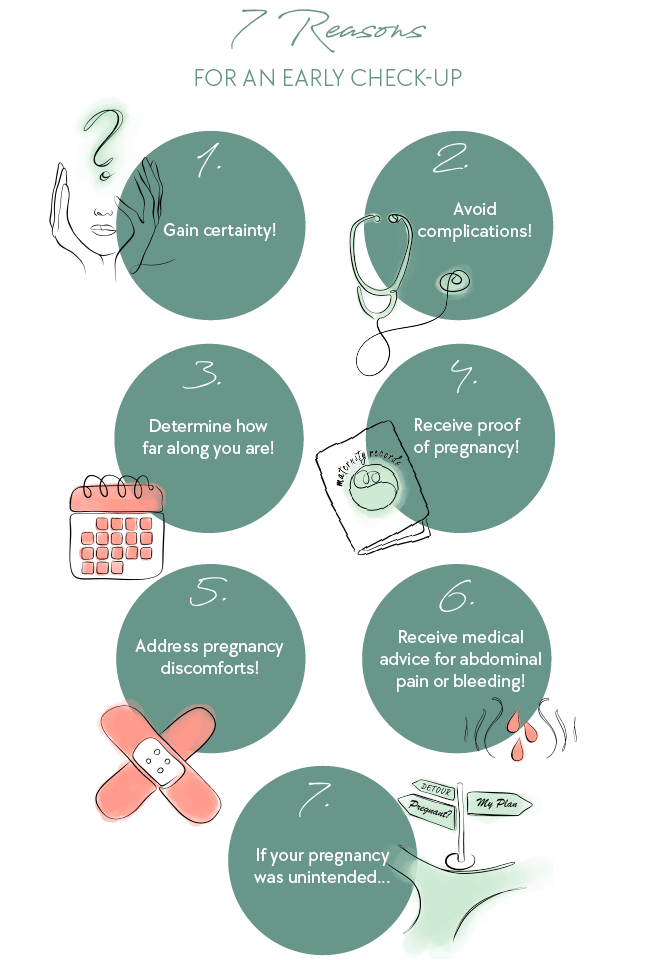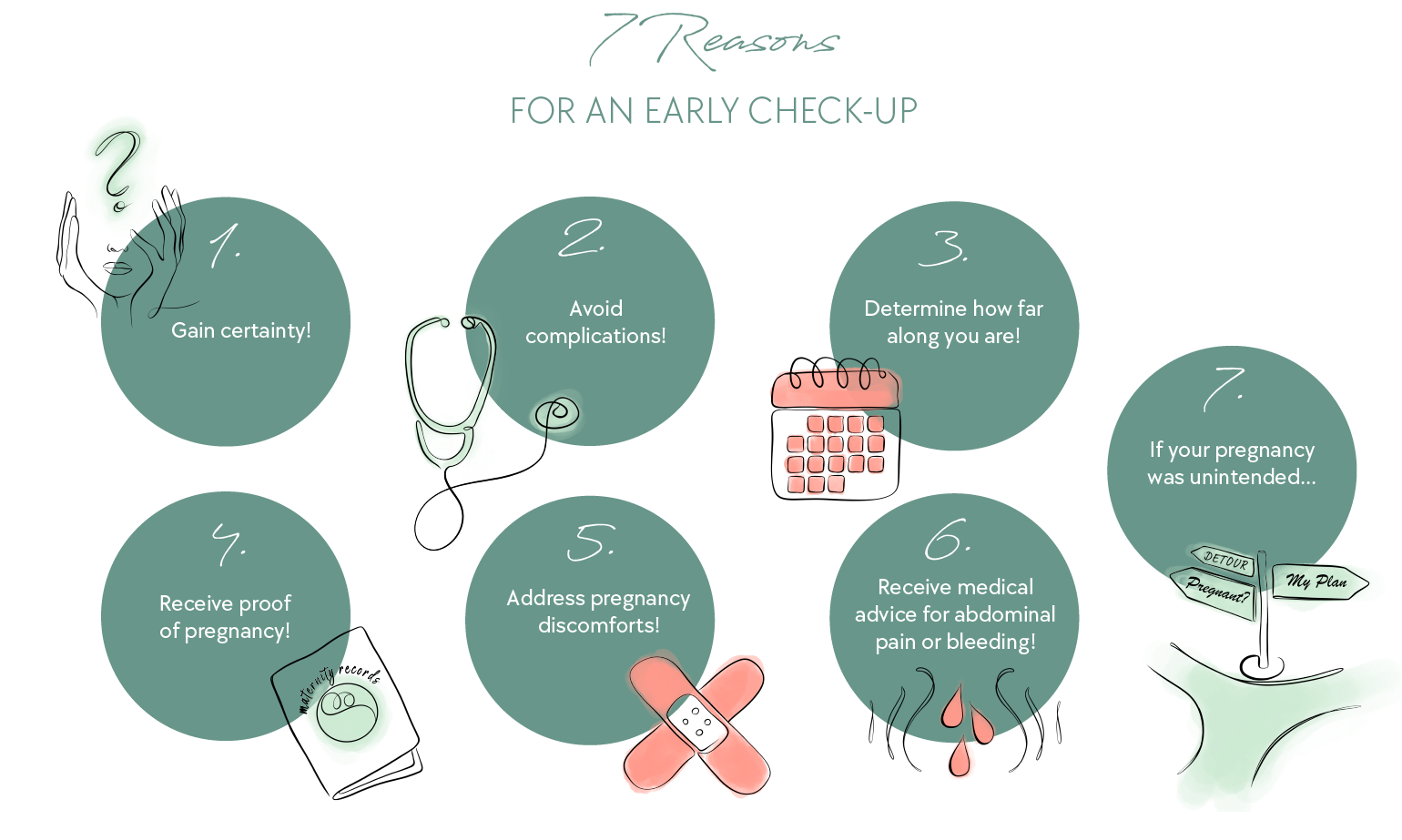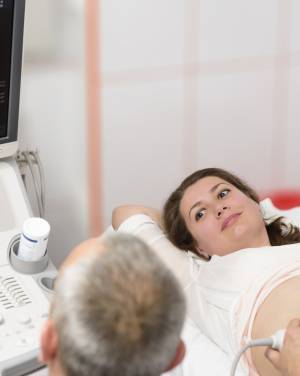When to Make the First Antenatal Appointment
🧑⚕️ How soon should I see a doctor? Take the Quiz!
It is up to you to choose when to schedule your first antenatal visit.
- Many women make their first pregnancy appointment right after a positive pregnancy test.
- You can see a doctor after missing your period, even without taking a home pregnancy test. Your doctor can confirm or negate your suspicions by testing for a possible pregnancy.
(Maybe) Pregnant: How Soon Should I See a Doctor? — Quiz
Are you wondering how soon to have a pregnancy appointment? Answer three multiple-choice questions about your situation and receive a professional evaluation within seconds on your screen.
liv_01 Ciaffoni_amore
Ich habe mich so gut aufgehoben gefühlt wie bei keinem Arzt und keiner Hebamme.
Die Unterstützung war mir Gold wert und hat mich wirklich in vielen Punkten unterstützt. Die Antworten kamen schnell, waren verständnissvoll und persönlich. Keine allgemeinen Texte die kopiert und an jeden geschickt werden, der sich dort meldet. Ich hatte meine persönliche Beraterin, der ich in aller Form danke sagen will für Ihre Unterstützung.
Diese Anlaufstelle ist absolut empfehlenswert!!!
7 Reasons for Early Maternity Care


1. Overcome Doubts
Were you unsure about the result of a home pregnancy test? Your doctor will be able to confirm whether you are pregnant or not. Your healthcare professional will give you another urine-based test or perform a blood test that detects the pregnancy hormone ß-hCG, aka hCG. This hormone can be traced in your blood six to nine days after fertilisation — much sooner than in your urine.
2. Preventative Measures
An ultrasound as early as four weeks after conception can help your healthcare professional determine whether the fertilised egg has attached itself to the correct place, your uterus. An ectopic pregnancy could be detected at this point, avoiding dangerous complications.
Regular screenings throughout the pregnancy will support the early detection of complications, allowing for timely treatment.
3. Determining Gestational Age and Due Date
The vaginal ultrasound will also reveal the dimensions of the amniotic sac. Using this data, and your LMP (date of your last menstrual period), your doctor can calculate how far along you are.
You will also be told your tentative due date, which will help you plan ahead.
- 👩🏽💼 Wondering when to inform your employer of your pregnancy? Go to When to Tell My Boss.
4. Proof of Pregnancy and Follow-up Appointments
You will need official documentation of pregnancy when applying for insurance, financial support, government housing, food stamps or maternity pay. Your doctor will be able to issue your proof of pregnancy.
- Go to Resources Near Me to find what kind of aid is available to you.
You will also have the opportunity to make follow-up appointments.
💕 Wenn Du Dir Begleitung während der Schwangerschaft wünschst, kannst Du hier unser kostenloses eBook "Das 2x1 der Schwangerschaft" erhalten. Infos, Inspiration, Ermutigung & Hilfe!
5. Addressing Pregnancy Discomforts
Being pregnant is a substantial physical adjustment that affects every woman differently. However, most women experience the typical signs of pregnancy to one degree or another.
These symptoms can get the best of you, affecting your ability to function. Sometimes morning sickness can be severe or extensive, leading to exhaustion.
If this describes your situation, or you feel like you are heading in that direction, seek medical advice as soon as possible. Severe discomfort can usually be avoided or diminished with proper medical care.
👍 Looking for hacks to alleviate your morning sickness? Go to Dealing with Morning Sickness.
6. Receiving a Diagnosis for Abdominal Pain or Bleeding
Doing so will help you ascertain whether you are experiencing a miscarriage or the fertilised egg may have implanted in the wrong place. Time is of the essence! Even if the symptoms, such as bleeding, were caused by something less serious than you thought — having it checked out is practicing excellent self-care.
7. If Your Pregnancy Was Unintended...
You may be experiencing an unplanned pregnancy — or maybe you had been trying for a baby, but now you feel overwhelmed as your concerns start piling up... Even in this situation, having your pregnancy confirmed by a physician or nurse midwife would be helpful. Depending on the test results, you can consult your doctor on possible ways to proceed.
Go for it! Even if you would prefer not to undergo an examination, it is worth making the appointment.
While waiting for your appointment, you may feel overrun with thoughts and fears. Our goal is to assist you in finding the path that is right for you. You are not alone! Our judgement-free resources were created with you in mind:
- ⚖️ Wondering whether to get an abortion? Take the Abortion Test!
- ⛑ Wondering where to start? Take the First Aid Test!
Your Pregnancy Confirmation Appointment
ℹ️ It may be comforting to know: especially if you have never met your gynaecologist, you can always ask for a consultation before the examination. Your doctor will probably ask about medical conditions and previous pregnancies. This is also your opportunity to raise any questions or concerns. Nothing you share will be disclosed. Every doctor is bound to confidentiality!
A blood or urine test can clarify whether pregnancy hormones are present. Thus, your doctor can confirm your pregnancy status. In addition, essential data (blood type, bacteria in the urine, etc.) can be determined and recorded.
At five weeks (one week after you missed your period), a vaginal ultrasound can reveal the amniotic sac in which the embryo is located. The embryo's heartbeat can be detected as early as the 6th week of pregnancy.
Other antenatal examinations may include palpation of your reproductive system, vaginal swabs, blood pressure, weight measurement, etc.
👍 It might be helpful to bring your vaccination record, allergy information and a list of medications you are currently taking.
❓If you do not have a gynaecologist yet, pay attention to the star rating and the comments section when you do a web search. You will want to find a doctor who is competent but also caring.
🤰🏻 Are you unsure whether you are pregnant? Take our Online Pregnancy Test! Answer multiple-choice questions about your situation and receive an immediate professional evaluation.
🍷🚬 Did you consume alcohol, drugs or tobacco before you knew you were pregnant? Take the Tox Test — Is the baby okay?
















